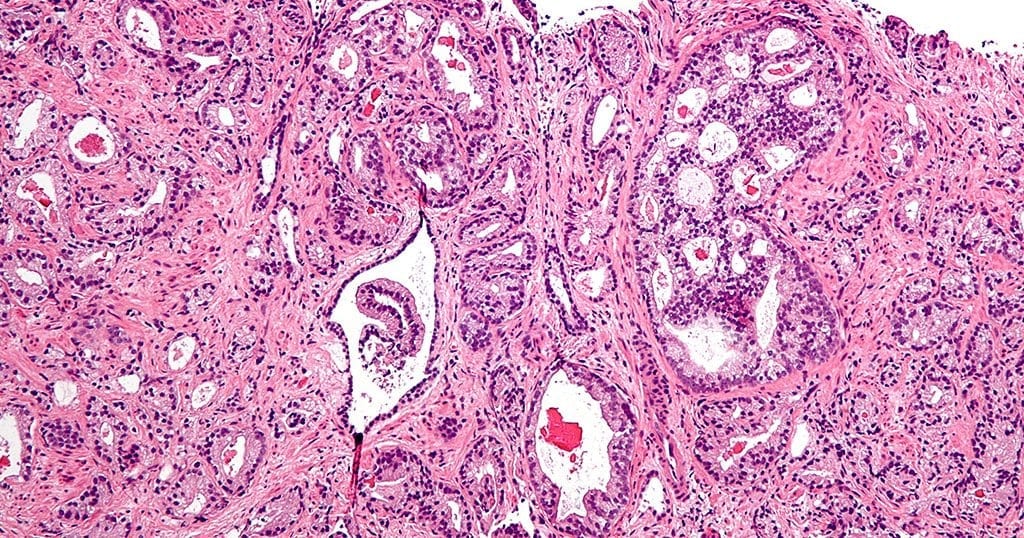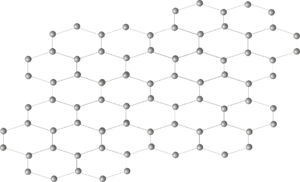
A natural, nontoxic product called genistein-combined polysaccharide, or GCP, which is commercially available in health stores, could help lengthen the life expectancy of certain prostate cancer patients, UC Davis researchers have found.
Men with prostate cancer that has spread to other parts of the body, known as metastatic cancer, and who have had their testosterone lowered with drug therapy are most likely to benefit. The study, recently published in Endocrine-Related Cancer, was conducted in prostate cancer cells and in mice.
Lowering of testosterone, also known as androgen-deprivation therapy, has long been the standard of care for patients with metastatic prostate cancer, but life expectancies vary widely for those who undergo this treatment. Testosterone is an androgen, the generic term for any compound that stimulates or controls development and maintenance of male characteristics by binding to androgen receptors.
The current findings hold promise for GCP therapy as a way to extend life expectancy of patients with low response to androgen-deprivation therapy.
Paramita Ghosh, an associate professor in the UC Davis School of Medicine, led the pre-clinical study with a team that included UC Davis Comprehensive Cancer Center Director Ralph de Vere White, a UC Davis distinguished professor of urology. Ruth Vinall in the UC Davis Department of Urology and Clifford Tepper in the UC Davis Department of Biochemistry and Molecular Medicine directed the studies in mice; Ghosh’s laboratory conducted the cell studies.
The research focused on GCP, a proprietary extract cultured from soybeans and shiitake mushrooms and marketed by Amino-Up of Sapporo, Japan. Researchers found that the combination of the compounds genistein and daidzein, both present in GCP, helps block a key mechanism used by prostate cancer cells to survive in the face of testosterone deprivation.
The research team had earlier shown that when a patient’s androgen level goes down, cancerous prostate cells kick out a protein known as filamin A, which is otherwise attached to the androgen receptor in the cell’s nucleus. The androgen receptor regulates growth of prostate cancer cells. Once filamin A leaves the cancerous cell’s nucleus, that cell no longer requires androgens to survive. Thus, loss of filamin A allows these cells to survive androgen deprivation, at and the cancer essentially becomes incurable.
The paper, titled “Enhancing the effectiveness of androgen deprivation in prostate cancer by inducing Filamin A nuclear localization,” shows for the first time that GCP keeps filamin A in the nucleus. As long as this protein remains attached to the androgen receptor, the cancerous cells need androgens to survive and grow. They die off when starved of androgens, thus prolonging the effects of androgen deprivation, which ultimately prolongs the patient’s life.
The team’s hypothesis is that metastatic prostate cancer patients with the weakest response to androgen-deprivation therapy could be given GCP concurrently with androgen deprivation therapy to retain Filamin A in the nucleus, thereby allowing cancer cells to die off.
The Latest Bing News on:
Prostate cancer
- The Shocking Exercise Men Can Do To Prevent Prostate Symptomson May 8, 2024 at 5:30 am
As the adage goes, an ounce of prevention is worth a pound of cure. And for men, this unexpected exercise can help prevent symptoms of prostate cancer.
- Prostate cancer breakthrough means men could avoid chemotherapyon May 8, 2024 at 4:39 am
Thousands of men a year with advanced prostate cancer could avoid gruelling chemotherapy by combining radiotherapy and hormone therapy, a study reveals. Targeting the radiotherapy to the sites where ...
- New trial finds radiotherapy combined with hormone therapy can help some advanced prostate cancer patients avoid chemotherapyon May 8, 2024 at 4:22 am
Radiotherapy can be used alongside hormone treatment, delaying the need for chemotherapy and therefore significantly protecting their quality of life for some patients with advanced prostate cancer, ...
- Batman actor and Bromley journalist team up for prostate cancer charity walkon May 7, 2024 at 5:00 pm
A Bromley journalist is set to walk side by side with Batman actor Colin McFarlane in a march to raise money for prostate cancer. The March for Men, a flagship Prostate Cancer UK event, takes place at ...
- MemorialCare Cancer Institute Revolutionizes Prostate Cancer Treatment: Hot Water Potential Solution to Prostate Canceron May 7, 2024 at 11:00 am
MemorialCare Cancer Institute at Saddleback Medical Center is the only location in Orange County – and one of only two in California – to offer a new, innovative way to treat prostate cancer patients ...
- Initial Quality of Life Decreases After Radiation in Prostate Canceron May 6, 2024 at 12:00 pm
Treatment with a certain radiation therapy worsens quality of life in patients with prostate cancer. An expert explains ways to mitigate side effects.
- Lack of Clinical Trial Availability Tied to Worse Prostate Cancer Mortalityon May 6, 2024 at 8:57 am
Of note, the most vulnerable counties had a lower prostate cancer incidence rate (mean 393.8 vs 411.7 per 100,000 people, P
- Ketone supplement may boost immunotherapy against prostate canceron May 2, 2024 at 9:00 am
Researchers have found that adding a pre-ketone supplement to immunotherapy boosted its effectiveness against prostate cancer in mouse models.
- Prostate cancer survivor sheds light on common stigmason May 1, 2024 at 6:01 am
“Because symptoms often don't appear before the cancer is at a more advanced stage, we need to be much louder about prostate cancer awareness and utilizing early detection as the first line of defense ...
- The nine things every man should know about prostate canceron May 1, 2024 at 1:23 am
Opening up about their below-the-belt health is not a conversation every man wants to have with his doctor, let alone his nearest and dearest – but the fact remains that every 45 minutes one man dies ...
The Latest Google Headlines on:
Prostate cancer
[google_news title=”” keyword=”prostate cancer” num_posts=”10″ blurb_length=”0″ show_thumb=”left”] [/vc_column_text]The Latest Bing News on:
Genistein-combined polysaccharide
- Novel Oral Synthetic Genistein Nanosuspension May Protect Against Negative Effects Of Radiation Therapy In Lung Canceron April 20, 2024 at 8:12 am
BIO 300 use led to reduced levels of a proinflammatory/profibrotic cytokine associated with lung injury from radiation therapy. BIO 300 did not interfere with the pharmacokinetics of chemotherapy, did ...
- Which colleges put together the best football and basketball seasons combined?on April 16, 2024 at 10:59 pm
In this edition of Sensational Sports Sevens, we rank the major college sports programs that produced the best combined football and basketball results this year. An interesting note is that only ...
- Recent advances in application of polysaccharides in cosmeticson April 9, 2024 at 5:00 pm
With the increasing application of natural ingredients in the cosmetics industry, the beneficial properties of natural polysaccharides have been effectively harnessed. Certain polysaccharides ...
- Powerball and Mega Millions jackpots now at a combined $1.9 billionon March 24, 2024 at 9:51 am
Be sure to get your tickets! The Powerball and Mega Millions Powerball jackpots are now at a combined $1.9 billion. The lottery prizes swelled after no tickets matched all six numbers in drawings ...
- Elon Musk predicts AI will likely be smarter than 'all humans combined' by 2029on March 13, 2024 at 12:20 pm
"By 2029, AI is probably smarter than all humans combined." READ ON THE FOX BUSINESS APP Musk has been outspoken about his concerns regarding AI and the dangers associated with it, often calling ...
- Accountancy Combined Programon October 5, 2023 at 5:33 pm
This requires additional education beyond the requirements for a bachelor's degree from Miami. High achieving students have the option of pursuing a combined degree program in which you can earn both ...
- Combined Degree Programson March 14, 2023 at 6:58 pm
The combined bachelor's - master's degree program allows highly qualified students to simultaneously pursue a baccalaureate and master's degree. Students considering the combined option should seek ...
- Hybrid Life Insurance and Long Term Care (2024)on March 16, 2021 at 12:41 pm
Drew Gurley is a licensed life insurance expert with nearly 15 years of experience. During his career as both a licensed life insurance agent and industry executive, he has helped thousands of ...
- UAB Internal Medicine-Pediatrics Residency Programon August 3, 2020 at 12:41 pm
combined Med-Peds subspecialties, academic medicine and more; Outstanding people who are diverse in life experiences and interests but who come together to care for patients and support each other ...
- Genistein improves BMD in osteopenic postmenopausal womenon June 16, 2020 at 3:57 pm
Genistein is a component of soya that is similar to 17β-estradiol, and might have protective effects against bone loss according to a number of small, short-term studies. Because of its ...
The Latest Google Headlines on:
Genistein-combined polysaccharide
[google_news title=”” keyword=”genistein-combined polysaccharide” num_posts=”10″ blurb_length=”0″ show_thumb=”left”]











